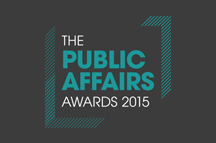Best Campaign in Scotland
Campaign: Tackling Tattie Targets
The 2015 Public Affairs Awards are dedicated to celebrating the best work that the Public Affairs industry has to show. As Media Partner, PubAffairs will be highlighting the entries of finalists in a number of categories.
The below entry is Weber Shandwick Scotland's submission in the Best campaign in Scotland category.
Tackling Tattie Targets - a public affairs campaign for the Potato Council (a division of the Agriculture and Horticulture Development Board)
Brief and ObjectivesPotato growers and processors are facing a crisis as consumption of fresh potatoes in Scotland plummets. For several years trends have shown that consumers are eating less of this once Scottish staple and turning to imported rice and pasta which are perceived as cheaper and more convenient as their preferred source of carbohydrate. Consumption in Scotland declined by 13% between 2012 and 2014, threatening an industry worth £119m to the UK economy and hundreds of rural jobs across Scotland. In addition, potato consumption targets which had been referenced in previous Scottish Government policy documents have disappeared from the latest health guidance. Weber Shandwick was asked to deliver a programme of strategic political engagement aimed at:
Research and planningOur parliamentary research revealed that the potato industry was absent from conversations on Scottish food and drink and that in fact had not been mentioned at all in parliament in recent years. We also found that the case for supporting the Scottish potato was in line with food and drink, sustainability and public health policy direction in Scotland, including the healthy eating agenda and the Scottish Government’s desire to promote sustainable local produce. We mapped out key points in the agricultural calendar to create new ways for politicians to engage with the industry and spike interest. This research was critical in shaping our campaign strategy. We recognised that we needed to share the positive economic, health and sustainability credentials of the Scottish potato with decision makers in order to pave the way for government and other influencers to help promote the product. Strategy and tactics
Tactics included:
Implementation
We secured a members debate in the Scottish Parliament to position the industry and its challenges front of stage in the chamber and provided briefings to MSPs who spoke. The following day we ran a lunch time briefing in parliament which gave MSPs the opportunity to find out more. We built on this activity with follow up meetings and briefings for MSPs, e-briefings and local GYOP visits, culminating in a final parliamentary event focused on declining potato consumption and the health credentials of potatoes, encouraging MSPs to get involved in promoting the potato. We leveraged the Potato Council’s relationships with other organisations including the Scottish Food and Drink Federation and the Rowett Institute to help boost the Potato Council’s profile. Role and results of public affairs and lobbyingDespite being delivered over a relatively short timeframe the campaign has already made a significant impact. Politicians from all parties engaged with the sector for the first time. The Potato Council now has a network of supportive politicians familiar with the industry and the issues it faces. Meanwhile the Scottish Government has engaged directly with the Potato Council to discuss the development of the new food and drink policy and the potato’s place within it. Measurement and objectivesOver the course of the year we regularly reached key MSPs and decision makers with messaging around the worrying decline in potato consumption as well as positive messaging on the health, sustainability and economic credentials of the Scottish potato:
|















 Our strategy was to create a regular stream of communications activity to raise awareness of the industry and the worrying decline in potato consumption and keep the issue front of mind amongst decision makers as the new food and drink policy was developed.
Our strategy was to create a regular stream of communications activity to raise awareness of the industry and the worrying decline in potato consumption and keep the issue front of mind amongst decision makers as the new food and drink policy was developed. Starting in late summer 2014, we delivered this programme of engagement over the course of a year. We developed messaging to build a narrative of the industry’s contribution to Scotland and its current plight. We identified politicians with remits or a strong interest in rural affairs, health and the economy. We then targeted these MSPs with one-to-one meetings in order to introduce them to the Potato Council and the campaign.
Starting in late summer 2014, we delivered this programme of engagement over the course of a year. We developed messaging to build a narrative of the industry’s contribution to Scotland and its current plight. We identified politicians with remits or a strong interest in rural affairs, health and the economy. We then targeted these MSPs with one-to-one meetings in order to introduce them to the Potato Council and the campaign.